Healthcare organizations locally and nationally have been experiencing hardships since the onset of the COVID-19 pandemic. The pandemic brought with it financial challenges that have persisted through today and have been amplified by an uncertain economy.
Unfortunately, the GBMC HealthCare system is not immune to these challenges. Like our peers, we’ve seen a dramatic increase in the cost of labor and certain contracts and are greatly impacted by inflationary increases to the prices of critical supplies and services.
While our healthcare system has a strong foundation of financial assets and tremendous community support, we are operating in an unexpectedly higher-cost business climate and we must take actions to remain successful in this new environment.
We have initiated many efforts aimed at reducing expenses and increasing revenue. In addition to these ongoing efforts, we announced a new Labor Expense Optimization Plan this week that will allow GBMC HealthCare to once again be profitable by January 1, 2024, at the latest.
Some key elements of this plan include:
• Aggressively recruiting nurses to ensure we have enough employed nursing staff and rely less on agency nursing support
• Scrutinizing open positions and redesigning workflows for efficiency and cost reduction
• Implementing a Voluntary Severance Plan (VSP) that enables a certain number of eligible employees in designated administrative and operational roles to volunteer for separation, while receiving a severance package to support their employment transition
If employees have questions regarding our Labor Expense Optimization Plan overall, they should follow their chain of command.
I want to reassure you that we will overcome this challenge! Our board of directors and I are committed to ensuring GBMC HealthCare remains independent. We have held strong for nearly 58 years, and we’ll continue to do so. I am thankful for our incredible leaders, staff, and volunteers for standing united with us through difficult times. I’m also eternally grateful to our generous donors who believe so strongly in us that they help in every way they can.
Through all of this, please know our promise to the community doesn’t change. We will continue to hold steadfast to our vision of providing every patient, every time with the care we would want for our own loved ones.

